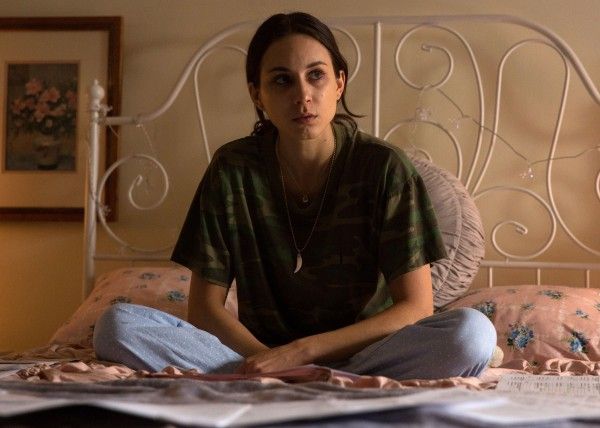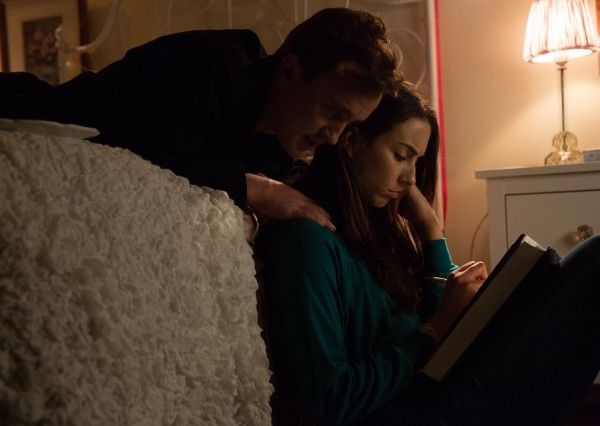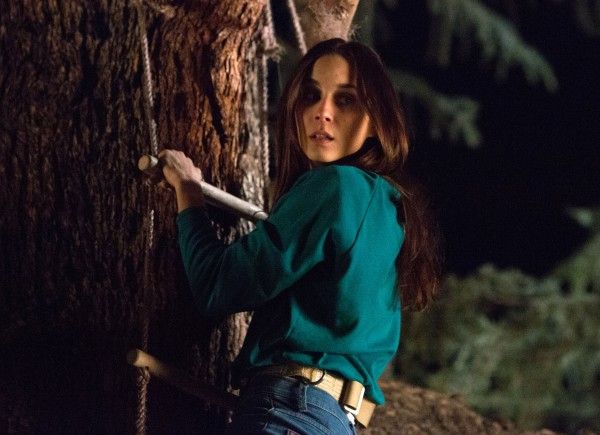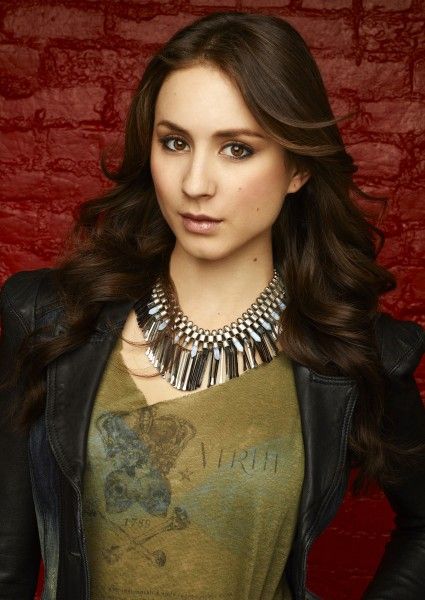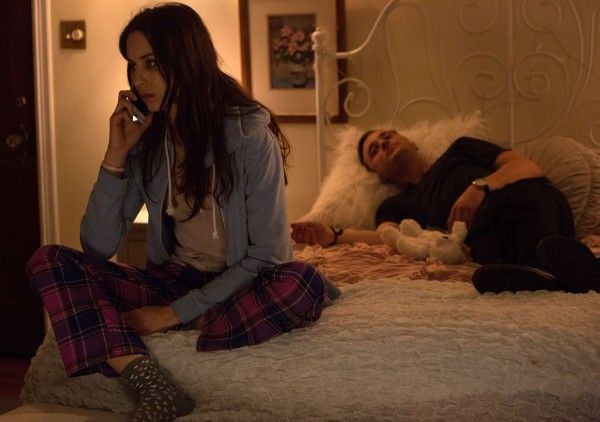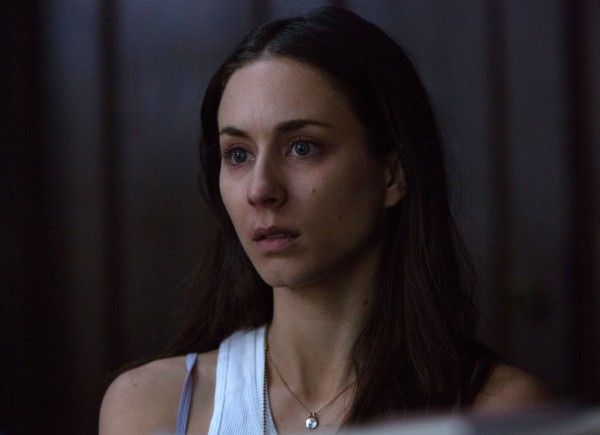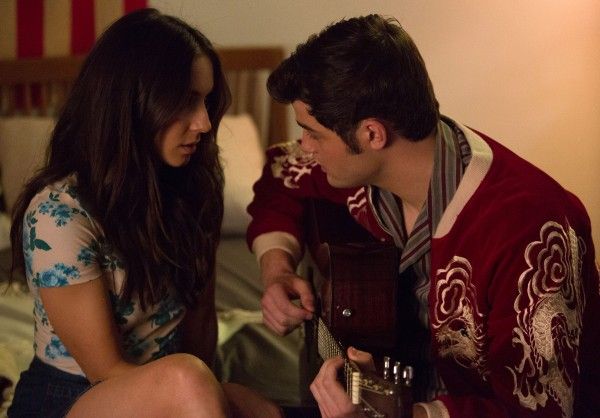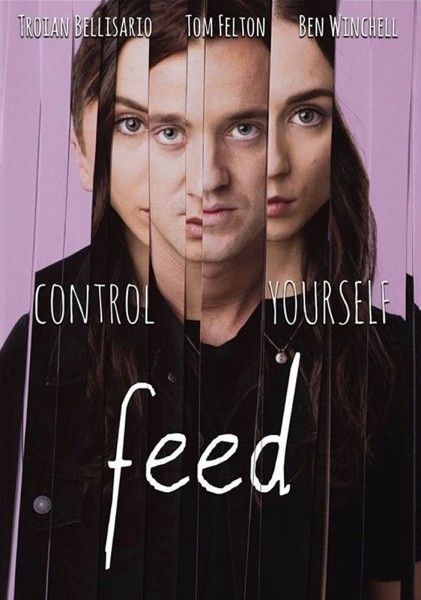Feed is a real labor of love for Troian Bellisario, who wrote, produced and plays the lead role in the intense film about a young woman named Olivia (Bellisario) who, along with her twin brother Matthew (Tom Felton), was born into a world of privilege that expects success and their futures shine bright. When unexpected tragedy tears them apart, Olivia must learn how to survive without her other half, which will test just how far she’s willing to go to not break their bond.
During this 1-on-1 phone interview with Collider, actress Troian Bellisario talked about what made her want to explore her own past struggle with an eating disorder in this way, how she wanted to delve into the subject in her first script, the support and feedback she got from friends and family, how the finished film compared to what she envisioned, and wanting to eventually direct a feature. She also talked about the seven seasons she spent on the TV series Pretty Little Liars and what she’ll take from that experience, as well as her excitement over being a part of the upcoming Richard Linklater film Where’d You Go, Bernadette. Be aware that there are some spoilers discussed.
Collider: How did you decide to tell this story in this way, and explore your own feelings and past with an eating disorder within this?
TROIAN BELLISARIO: Oftentimes, people have a lot of false ideas about what it means to struggle with an eating disorder, and I really wanted to try to find a way to convey a narrative that would challenge people’s expectations of what they think of anorexia or an eating disorder, and what they think it looks like or feels like for the person going through it. Where that came from, for me, was to get people who had never struggled with this to empathize, and a huge part of that was personifying the disease in a character that you knew and trusted and loved from the beginning. You saw why Olivia loved her brother Matt, so if she was going to hear him say these things to her, she was gonna follow his orders and trust that he had her best interests at heart. In the end, when she discovered that it wasn’t her brother and really she was hearing this disease speaking to her, I thought it would be a hopefully more effective way to try to communicate that.
It’s such an interesting and different way to handle the subject matter because people often just focus on the disease and not on the human side of it.
BELLISARIO: Yeah. I’m really grateful that you brought that up because, to me, a lot of people just kept on saying, “Oh, you know what you’re doing is dangerous, so why don’t you just eat?” What I was trying to convey to a lot of people is that there’s a large portion of your eating disorder that’s a way of dealing with something deeper. It’s a coping mechanism, and you have coping mechanisms in your life because they work. That was a tough thing for me. I wanted to convey that, particularly with Olivia in the beginning of her engagement with the disease. It’s helping her do everything that she needs to do. It’s helping her avoid the grieving process of losing her brother. It’s helping her maintain this perfect exterior and fulfill everybody’s expectations of her and go to college. It’s helping her in a lot of ways. And then, inevitably, what it’s going to do is get out of control and hurt her. That was really important for me to show not the positive side, but why it’s so seductive and why you get pulled in so deep.
Once you had the script finished, who was the first person you gave it to, to read and give you feedback, and did you get any feedback from anyone that you really took to heart and incorporated into it?
BELLISARIO: A lot of my friends have read this script and given me a lot of really wonderful support and advice and thoughts. Mostly, they’ve just been supportive because a lot of those people, including my family, have a lot of experience in writing. Both of my parents are writers, and when they read the script, the wonderful thing is that they really didn’t turn around and say, “All right, here’s where your third act falls apart.” What they said was, “Here are the parts that I think could be stronger. Here are the parts where I think you could lean in more. If this is your experience, you need to trust yourself enough to move forward with it.” It was really wonderful. Also, I worked with some really wonderful people. There was a producer, named Jon Avent, who I had spoken to about this, who’s really wonderful and who tried to help me get this made for a long time. He was really helpful in supporting me and the script and giving me guidance. And then, ultimately, when I got to make it with my best friend, Tommy Bertelsen, who’s the director, he was really instrumental to me because he said to me, “Here’s the part where I think I know what you’re going for because I know you, but I think it needs to be pulled out stronger, or in this way. This is how we need to set this up, visually, so that we can really drive home what’s going on in this scene.” So, I’ve had a lot of really wonderful help and support, along the way.
How does this finished film compare to the what you envisioned it might be like, when you finished writing the script?
BELLISARIO: Oh, god, that’s always heartbreak, right?! You dream of something, and I lived with these characters in my head for almost seven full years before I got to act Olivia. One of the scariest parts for me was that I was having this constant dissociative experience, where I would think about a scene for years and years and years, and then, all of a sudden, it was just shot and done. The amount of time that we had to shoot it and the budgetary constraints and the screaming neighbor, or whatever it was that would affect us shooting it, I was like, “Well, that’s that scene.” But, that is the pain of making any movie. You have an idea of what you want the film to look like, and then you shoot it and you’re faced with the film that you have. And then, it’s about making that movie. There were lots of scenes that we had to cut or edit or reconstruct because they didn’t work for whatever reason, whether it was budgetary or time, or anything like that. Suddenly, you’re like, “Okay, what is the purpose of this scene and how can we shot it in a different way?” It was a wonderful creative experience.
Would you say that you’re you more nervous about putting your first script out in the world, or about acting in this and having to talk about how your own life has personally inspired all of this?
BELLISARIO: Both! My god, totally both! I’m very nervous about the fact that it’s my first screenplay. It’s a whole new level of vulnerability, in a putting yourself out to the world way. That’s scary! But I think it’s also balanced by the fact that it is such a personal story to me. I’m really proud of the story that we told and the film that we made. With everything that I wish was different, or that I wish I had more time or money to do, I think that it works. It’s a really beautiful and powerful little piece, and I’m grateful that I got the chance to do it.
You also got to try your hand at directing an episode of Pretty Little Liars in the final season. Is the next step directing a film, and having it also maybe be one that you’ve written?
BELLISARIO: Oh, my gosh! I think I want to learn a lot more before I try my hand at that. One of the biggest things for me, with Feed, that I said to myself awhile ago was, “Either I’m going to act in this and I’m going to make it like that, or I’m going to wait a very, very long time and get a lot of experiencing directing, and then I’m going to direct it with somebody else as Olivia.” I knew that I didn’t want to do both. I knew that the way I wanted to enter and engage with the character, I also didn’t want to have to worry about anything my director had to be worrying about. It was such an internal role for me that I knew that I couldn’t have that extra part of me that was functioning in a way where I had to have my eyes on everything. And Tommy, my director, was wonderful, in that way. He would be like, “You’re wearing a lot of hats, and I’m only going to allow you to wear one hat at a time.” So, he would come in and he’d be like, “Hey, I need to talk to my producer,” and we’d have a producer conversation. And then, he’d be like, “Okay, great, producer done. Go back to being an actor.” It was wonderful because he allowed me to fully do one thing at a time, and it gave me such creative license and freedom to do it.
You got to have an experience on Pretty Little Liars that’s just so rare, in that the show lasted for seven seasons and you were on it throughout. When you look back on your time on the series, what do you think will most stand out for you?
BELLISARIO: Just the experience of working that long with that group of people. There was a level of ease and comfort. When you’ve done something for over 10,000 hours – and I did the calculations and came up with that I had just reached 10,000 hours of acting on Pretty Little Liars – that, to me, was a crazy moment of realizing the ease with which I felt I could experiment with that character, or try something and fail, or be bold, or push myself. At that point, I felt like I was at home, and not in a way that I was bored, but in a way where I was given freedom. These people had seen me act for seven years. If I did a take and it was bad, I didn’t have to be embarrassed about it. I could be like, “Hey, that was bad. Let me do that again.” To have that power and artistic freedom, that was really important and a really wonderful experience.
You’re also a part of Richard Linklater’s upcoming film, Where’d You Go, Bernadette. What is most exciting you about that project?
BELLISARIO: Oh, everything! The material itself was overwhelming. There’s a lot of scripts that you read where you’re like, “Okay, I really like this aspect of it, but I wish this was different, or I wish this was stronger.” Reading that script, I just got lost in a world. It was the same experience that I had when I read the book. I’m a huge fan of Richard Linklater’s films, and I’m a huge fan of Cate Blanchett’s work. All around, it just feels like I get to watch masters work. I get to watch artists play, and I get to play with them. I really feel very grateful.
Have you already started writing other projects that you’re hoping to get into production?
BELLISARIO: For so many years, if I was going to sit down to write, it was going to be to work on Feed, so it’s really weird to break out of only working on one storyline. For me, it’s really been about allowing myself the freedom to sit down and work on this treatment that I have for a television show, or to work on an outline for a film, or write a scene from another story. It’s about the exercise of trying to expand my ability as a writer because I feel very new to it. I have a lot of things that I’m excited to write, but it’s a constant process, and I think I’m just beginning my experience with it.
Coming from a family that’s in the business, and you made your acting debut when you were very young, when did you decide that this was what you wanted to do and fully own that decision for yourself?
BELLISARIO: It was something that I always wanted to do, from a very young age, which is why I was a four-year-old that had my first acting job. I was fortunate enough to grow up on a set and I told my parents, “I really want to do what the actors are doing.” They were kind enough to create a role for me and let me experience it, and I did, but I came back and I was like, “I don’t know if I want to do that. It’s boring and you make me say lines, over and over again.” They didn’t put any pressure on me to be an actor. It wasn’t until I was a teenager that I came back to them and said, “Hey, I was a four-year-old, and now I have no problem with doing multiple takes. I really want to be an actor.” And they said, “Okay, great! So, what are you going to do about it?” That was when I went out and sought representation, and then I realized that I didn’t know anything about the craft. I had actors that I really admired and I noticed that they all studied in the theater, so that was when I started applying to theater schools and wanted to get an education and build my craft. It wasn’t until my junior year in college when my dad finally said to me, after seeing me in a play, “You know what? Maybe you can actually do this.” It’s not that they weren’t supportive. They just taught me that things don’t fall out of the sky and land in your lap. If you want to make a long career out of this, you better treat it with the respect of a craft and you better constantly be learning.
Feed is now available on VOD and digital platforms, as well as on DVD.


